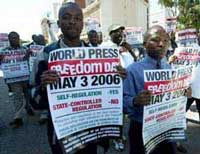
BULAWAYO - "We feel this [banning marches] is unfair ... because what we simply wanted to do was to observe our day," said Mathew Takaona, president of the Zimbabwe Union of Journalists (ZUJ), which had scheduled marches in major towns and cities to observe the day. The union was also going to demand an end to the ongoing arrest and torture of journalists by state security agents.
Police spokesman Wayne Bvudzijena was not available for comment.
In its World Press Freedom Review report released on Monday, the International Press Initiative (IPI) said although Zimbabwe was not the most dangerous country for journalists to work in, it was probably the most difficult. The ban came as local and international press freedom lobby groups called for the establishment of independent media organisations.
The Media Alliance of Zimbabwe (MAZ) - a coalition of groups that includes the Media Institute of Southern Africa (MISA)-Zimbabwe, ZUJ and others - also noted that media laws were being used selectively to muzzle the independent media.
"The widely condemned Access to Information and Protection of Privacy Act (AIPPA), the Public Order and Security Act (POSA), and the Broadcasting Services Act (BSA), continue to be used with impunity to muzzle the media and harass journalists," MAZ said in a statement. "The intimidation, harassment and unlawful arrests, detentions and torture of journalists going about their professional duties continue unabated."
Journalists in the capital, Harare, were set to march to the offices of the Media and Information Commission (MIC), which issues licenses that allow the media and journalists to operate, to petition the commission to improve working conditions for journalists and repeal restrictive media laws, particularly AIPPA.
The commission can withdraw licences from journalists who refuse to toe the line, and journalists caught practising without a licence are liable to a two-year jail term, provided for in AIPPA.
Another law, POSA, imposes up to two years in jail for journalists convicted of publishing falsehoods that may cause public "alarm and despondency", while the Criminal Codification Act attracts a 20-year jail sentence for journalists convicted of denigrating the Zimbabwean president.
Last month, Edward Chikomba, a cameraman previously with the state broadcaster, Zimbabwe Broadcasting Corporation, was abducted from his home in Harare and later found murdered.
Many journalists believe Chikomba was murdered for allegedly transmitting the images of a bruised and battered Morgan Tsvangirai, leader of one of the factions of the main opposition party, Movement for Democratic Change, to the international media, a charge the police have strongly denied.
Article courtesy of IRIN